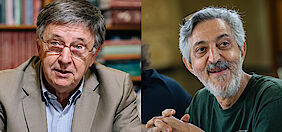News & Academies' activities
Lovász and Wigderson to share the Abel Prize
The Norwegian Academy of Science and Letters has decided to award the Abel Prize for 2021 to László Lovász of Alfréd Rényi Institute of Mathematics (ELKH, MTA Institute of Excellence) and Eötvös Loránd University in Budapest, Hungary
and
Avi Wigderson of the Institute for Advanced Study, Princeton, USA,
“for their foundational contributions to theoretical computer science and discrete mathematics, and their leading role in shaping them into central fields of modern mathematics”
The theory of ‘computational complexity’ – which concerns itself with the speed and efficiency of algorithms – was in its infancy in the 1970s, and is now an established field of both mathematics and theoretical computer science. Computational complexity has become important, providing the theoretical basis for internet security. Also in the 1970s a new generation of mathematicians realised that discrete mathematics had, in computer science, a new area of application. Today algorithms and internet security aspects are an integral part of everyday life for all of us. The work of László Lovász and Avi Wigderson has played an important part of this development.
“Lovász and Wigderson have been leading forces in this development over the last decades. Their work interlaces in many ways, and, in particular, they have both made fundamental contributions to understanding randomness in computation and in exploring the boundaries of efficient computation,” says Hans Munthe-Kaas, chair of the Abel committee.
He continues: “Thanks to the leadership of these two, discrete mathematics and the relatively young field of theoretical computer science are now established as central areas of modern mathematics.”
László Lovász
A brilliant mathematician since he was a teenager, László Lovász more than delivered on his early promise. His work has established connections between discrete mathematics and computer science. Born in 1948 in Budapest, Hungary, he has also served his community as a writer of books, noted for their clarity and accessibility, as an inspirational lecturer, and as a leader, spending a term as president of the International Mathematical Union (2007-2010).
In the 1970s graph theory became one of the first areas of pure mathematics able to illuminate the new field of computational complexity. One of the major impacts of Lovasz’s work has been to establish ways in which discrete mathematics can address fundamental theoretical questions in computer science. He later said that he was very lucky to experience one of those periods when mathematics was developing completely together with an application area.
In addition to his work on the foundational underpinning of computer science, Lovász has also devised powerful algorithms with wide-ranging applications. One of these, the LLL algorithm, named after Lovász and the brothers Arjen and Hendrik Lenstra, represented a conceptual breakthrough in the understanding of lattices, and which has had remarkable applications in areas including number theory, cryptography and mobile computing. Currently, the only known encryption systems that can withstand an attack by a quantum computer are based on the LLL algorithm.
Lovász has won many awards including the 1999 Wolf Prize, the 1999 Knuth Prize, the 2001 Gödel Prize and the 2010 Kyoto Prize.
Avi Wigderson
Wigderson is known for his ability to see links between apparently unrelated areas. He has deepened the connections between mathematics and computer science. He was born in Haifa, Israel, in 1956. His contribution to enlarging and deepening the field of 'complexity theory’ – which concerns itself with the speed and efficiency of algorithms – is arguably greater than that of any single other person.
Wigderson has conducted research into every major open problem in complexity theory. In many ways, the field has grown around him. He has co-authored papers with more than 100 people. He has deepened the connections between mathematics and computer science.
The most important present-day application of complexity theory is internet cryptography. Early in his career Wigderson made fundamental contributions in this area, including the zero-knowledge proof, which today is being used in cryptocurrency technology.
In 1994, Wigderson won the Rolf Nevanlinna Prize for computer science. Among his many other prizes is the 2009 Gôdel Prize and the 2019 Knuth Prize.
About the Abel Prize:
• The honoring of the Abel Prize laureates will be announced later.
• The Abel Prize is funded by the Norwegian Government and consists of MNOK 7.5.
• The prize is awarded by the Norwegian Academy of Science and Letters.
• The choice of the Abel laureates is based on the recommendation of the Abel Committee, which is composed of five internationally recognized mathematicians.
• For more information, please visit www.abelprize.no
Press contact for László Lovász:
Member of Communications Department
Emese Jokuthy
jokuthy.emese@titkarsag.mta.hu
Phone: +36 302 403 898
Press contact for Avi Wigderson:
Interim Communications/Public Relations Manager; Institute for Advanced Study, Princeton, USA, Lee Sandberg
Phone: +1 (609) 455-4398
Press contact for the Norwegian Academy of Science and Letters/The Abel Prize:
Head of Communications: Marina Tofting
marina.tofting@dnva.no
Phone: +47 938 66 312

































